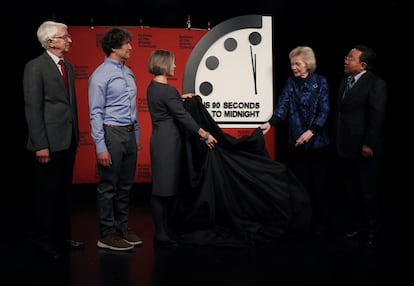‘Doomsday Clock’ is now the closest it’s ever been to Armageddon
‘We are sending a message that the situation is becoming more urgent,’ warned Rachel Bronson, the president of the Bulletin of Atomic Scientists

With Russia’s invasion of Ukraine and the specter of nuclear weapon use, Earth crept its closest to Armageddon, a science-oriented advocacy group said, moving its famous “Doomsday Clock” up to just 90 seconds before midnight.
The Bulletin of Atomic Scientists, which includes Nobel laureates, set the symbolic clock in motion in 1947, shortly after the first atomic explosions: the closer we are to midnight on the Doomsday Clock, the closer we are to the end of the world.
“We are really closer to that doomsday,” former Mongolian president Elbegdorj Tsakhia said Tuesday at the Bulletin of Atomic Scientists annual announcement rating how close humanity is from doing itself in. He and former Ireland president Mary Robinson joined scientists to underscore what they consider a gathering of several existential threats, with Russian leader Vladimir Putin’s actions and words chief among them.
“People and scientists are warning us and we have to wake up now,” he said.
The advocacy group started in 1947 to use a clock to symbolize the potential and likelihood of people doing something to end humanity. It moved the clock 10 seconds closer than last year, making it the closest it has ever been to striking 12. It’s been as much as 17 minutes from midnight after the end of the Cold War but in the past few years, the group has changed from counting down the minutes to midnight to counting down the seconds.
Doomsday has not happened yet.
“We are sending a message that the situation is becoming more urgent,” Bulletin President Rachel Bronson said at the online announcement. “Crises are more likely to happen and have broader consequences and longer standing effects.”
And to emphasize the effect that Russia’s invasion of Ukraine had on moving closer to theoretical doomsday, the group said it was also announcing the clock movement in the Russian and Ukrainian languages for the first time.
“Putin has repeatedly raised the specter of nuclear use,” said Steve Fetter, dean of the graduate school and a public policy professor at the University of Maryland.
“Putin has given no indication that he’s willing to accept defeat,” Fetter said. “He might make desperate moves if no other options are available that he regards as acceptable.”
Scientists and activists at the Bulletin announcement also mentioned nuclear weapon proliferation in China, Iran increasing its uranium enrichment, missile tests in North Korea, future pandemics from animal diseases, pathogens from lab mistakes, “disruptive technologies” and worsening climate change as other existential threats to humanity.
“From almost every perspective, the risk of nuclear catastrophe is higher today than last year,” Fetter said Tuesday.
Suzet McKinney, another member of the board of the Bulletin of Atomic Scientists, highlighted the existential threat posed by new pandemics and biological weapons. To mitigate these risks, McKinney recommended dismantling biological weapons programs, investing in early warning systems to prevent pandemics and encouraging countries to share public health information among themselves.
Sivan Kartha, a senior scientist at the Stockholm Environmental Institute, warned that the energy crisis caused by war in Ukraine has set back efforts to combat climate change, leading to a rise in coal consumption in Germany. In a press release, the Bulletin of the Atomic Scientists said that the torrential rains in Africa and the deadly “monsoon on steroids” in Pakistan, which affected 33 million people in 2022, were evidence of the pressing need for coordinated international action to tackle the climate crisis.
Sign up for our weekly newsletter to get more English-language news coverage from EL PAÍS USA Edition
Tu suscripción se está usando en otro dispositivo
¿Quieres añadir otro usuario a tu suscripción?
Si continúas leyendo en este dispositivo, no se podrá leer en el otro.
FlechaTu suscripción se está usando en otro dispositivo y solo puedes acceder a EL PAÍS desde un dispositivo a la vez.
Si quieres compartir tu cuenta, cambia tu suscripción a la modalidad Premium, así podrás añadir otro usuario. Cada uno accederá con su propia cuenta de email, lo que os permitirá personalizar vuestra experiencia en EL PAÍS.
¿Tienes una suscripción de empresa? Accede aquí para contratar más cuentas.
En el caso de no saber quién está usando tu cuenta, te recomendamos cambiar tu contraseña aquí.
Si decides continuar compartiendo tu cuenta, este mensaje se mostrará en tu dispositivo y en el de la otra persona que está usando tu cuenta de forma indefinida, afectando a tu experiencia de lectura. Puedes consultar aquí los términos y condiciones de la suscripción digital.








































